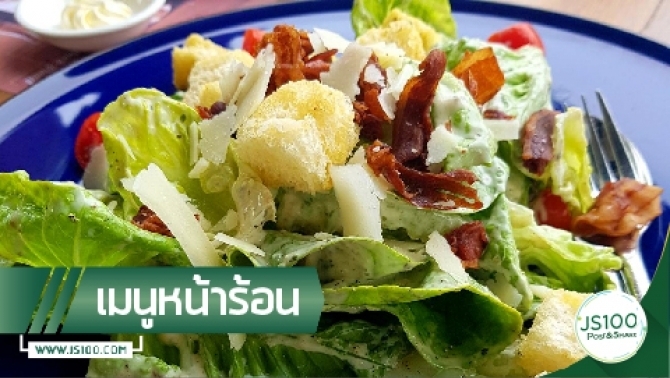During the summer months, it is advised to be careful when choosing what to consume because some foods might make you feel hotter. Here are some tips that Thais traditionally follow when choosing foods that are appropriate for this time of the year when it feels like the thermometer is going to burst open.
1. Avoid eating too much fat and excessive meat because during the summer, the body does not require as much to produce body heat. The keyword being “excessive,” as everyone’s body, energy requirements, and exercise routines vary. Plus, healthy fats are very beneficial, such as DHA, so consider which type of fat you are consuming. Also, the latest science shows that cholesterol is actually not as dangerous as it was previously made out to be. Cholesterol is after all, a precursor to the building blocks for the production of vital hormones so please do not avoid fat and meat completely. Just reduce excess fried foods and meat so that the intestines do not have to work so hard during the day when it’s really hot. This also lessens the chance of catching a disease from bacteria that could be in contaminated meat. Another way to lessen the workload is to decrease the time period that you eat or follow an intermittent fasting schedule. Either way, stay hydrated; which brings us to the next tip.
.jpg)
2. Drink lots of water because the body loses lots to perspiration as it tries to release heat. Also, replenish minerals because those are also excreted while sweating.
3. Avoid too much coconut milk. For example, green curry and bua loi (Thai dessert) because the high temperatures could affect the coconut milk and cause diarrhea.
4. Eat veggies and fruits that have a high water content. This is an easy way to add vitamins and minerals which will help rejuvenate the body.
Here are some guidelines on what to consume during the summer months in Thailand
Drinks: water (top choice), lemon/lime water, chrysanthemum tea, pandan, bael, pennywort leaf, roselle, luo han kuo (monk fruit), Chinese traditional dried herb drink, coconut water, aloe vera, lotus seed, mangosteen, lemongrass, soybean milk, yanang leaf tea, rang jued/jut (thunbergia laurifolia), and triphala (a drink with three medicinal herbs - but be warned that there is sugar added to this drink).
Food: bitter gourd dishes, Thai clear soup with green vegetables, Thai sweet and sour vegetable soup, Thai clear soup with ivy gourd leaves, tom yum (clear spicy Thai soup), stuffed bitter gourd soup, khao chae (rice soaked in water), bami yen (cold wheat-egg noodles), salad, tao hoo song kreung (Thai rich tofu with sauce), gaeng som sai bua (Thai sour curry with lotus stem), and yam som-o (pomelo salad).
Vegetables: bitter gourds, cucumbers, mustard greens, wax gourds, chayote, bottle gourds, daikon, ivy gourd leaves, holy basil, luffa/sponge gourds, straw mushrooms, mung beans, white jelly fungai, water chestnuts, malva nuts, lotus roots, hair algae, red algae or purple laver, garland chrysanthemums, bok choy, morning glory, tomatoes, and bean sprouts.
Fruits: watermelons, muskmelons, Asian pears, cantaloupes, pineapples, toddy palms, star fruits, and pomelos.
Overall, who’s to say what you should or should not eat. However, the aforementioned guidelines do serve as a good starting point in making your decisions when dealing with the heat. Remember that either way, consuming too much of any one thing is not advised, so consume a balanced diet and enjoy some fun in the sun!
.jpg) อ่านเวอร์ชั่นภาษาไทย (คลิ๊ก)
อ่านเวอร์ชั่นภาษาไทย (คลิ๊ก)

.jpg)
.jpg)
.jpg)
.jpg)
.jpg)
.jpg)
.jpg)
.jpg)
.jpg)